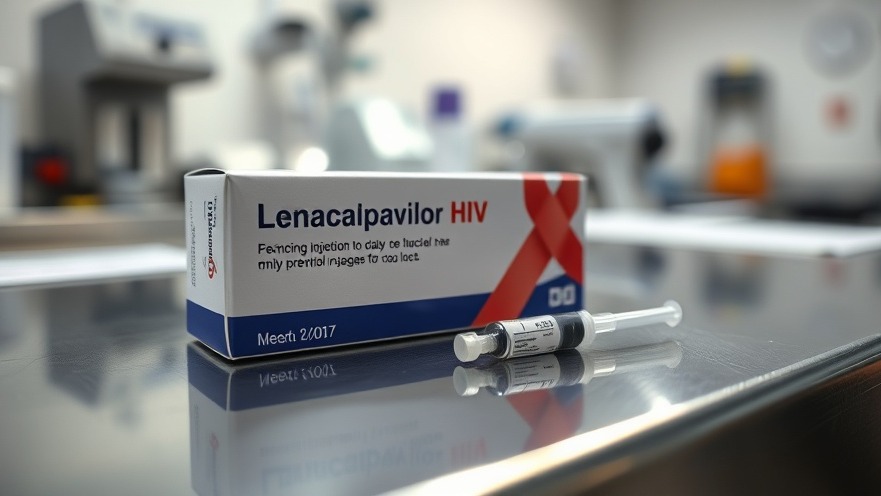
Revolutionary Approval: Understanding Lenacapavir
The recent FDA approval of lenacapavir, branded as Yeztugo, marks a significant milestone in HIV prevention efforts. As a twice-yearly injection, this drug promises to transform the landscape of HIV prophylaxis. Clinical trials indicated that an impressive 99.9% of participants who received lenacapavir remained HIV negative, a statistic that highlights its potential efficacy in curbing new infections. Gilead Sciences, the company behind the drug, claims that this approval ushers in a new era where we could potentially end the HIV epidemic, reflecting optimism echoed by healthcare professionals around the nation.
The Context Behind HIV Prevention
As of 2022, over 31,800 new HIV infections occurred in the United States, demonstrating a dire need for effective preventive measures. The introduction of lenacapavir provides a powerful new tool in combatting this ongoing public health crisis. Public health officials have long emphasized the importance of accessible, effective prevention methods, as high transmission rates indicate a persistent vulnerabilities in epidemic control.
A Historical Perspective: Lessons From The Past
Historically, HIV treatment and prevention have advanced significantly, yet challenges remain. The approval of lenacapavir is reminiscent of earlier breakthroughs such as the introduction of combination antiretroviral therapy, which transformed HIV from a fatal diagnosis to a manageable condition. However, lenacapavir's acceptance does not negate the pressing need for a preventive vaccine, a sentiment echoed by Dr. Barton Ford Haynes, director at Duke Human Vaccine Institute. He notes that while lenacapavir is a remarkable development, it should not overshadow the requisite search for a vaccine.
Controversial Cuts: Implications for Vaccine Research
Despite the strides made with lenacapavir, the Trump administration's decision to scale back funding for HIV vaccine research raises concerns among scientists and advocates. With ongoing research showing promising outcomes, experts warn that halting this support could delay advancements for years, relegating potential discoveries to obscurity. Dennis Burton from Scripps Research stresses that discontinuing funding undermines future innovations in the fight against HIV, as vital research networks could be dismantled prematurely.
The Path Forward: A Dual Approach to HIV Prevention
The emergence of lenacapavir signals an essential evolution in HIV prevention, but it simultaneously highlights a critical crossroads. As healthcare advocates and researchers rally for renewed funding toward vaccine studies, it becomes evident that a multi-faceted approach is necessary to comprehensively address HIV. Combining the advantages of long-acting injectable options like lenacapavir with future vaccines may significantly enhance prevention strategies, ultimately leading to a decrease in infection rates.
Encouraging Insights From The Community
Community acceptance and understanding are vital to the successful implementation of lenacapavir. Health organizations must enhance outreach to ensure that at-risk populations are aware of this new prevention strategy. With effective education initiatives, we can empower individuals with information, allowing them to make informed decisions about their health.
Final Thoughts: A Call to Action
The approval of lenacapavir is a hopeful development in the ongoing struggle against HIV, but it brings forth the necessity for robust funding and support for vaccine research. As we celebrate this milestone, we must also advocate for continued investment in comprehensive approaches to HIV prevention. Now is the time to engage with local health organizations and support funding initiatives to ensure that the momentum in HIV research continues. Your voice can make a difference in the fight against HIV.
 Add Element
Add Element  Add Row
Add Row 



Write A Comment